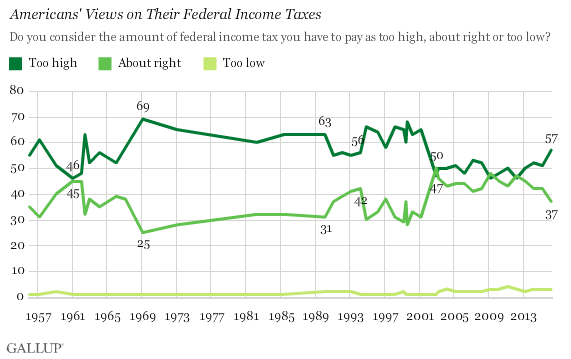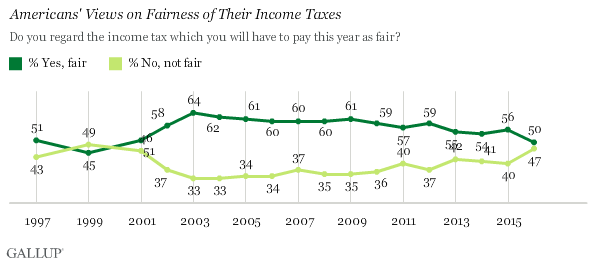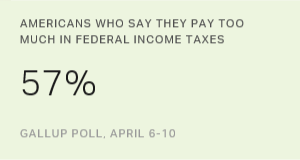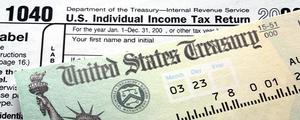Story Highlights
- 57% say they pay too much in federal income taxes
- Highest percentage since the 2001 tax cut
- 47% say their taxes are unfair, highest since 1999
WASHINGTON, D.C. -- As the deadline looms for filing federal income taxes, 57% of Americans say they are paying too much in taxes -- a six-percentage-point increase from last year and the highest percentage in 15 years.

The results, from an April 6-10 Gallup poll, mark the first time since a major tax cut was enacted during the Bush administration in 2001 that more than 53% of Americans have said their taxes are too high. In three years during that time (2003, 2009 and 2012), Americans were more likely to say they were paying the right amount than to say they were paying too much. This is something that had not occurred in the 28 times Gallup asked the question from 1956 to 2001.
Partisan Gap Widens as More Republicans Say They Pay Too Much
The partisan gap in views of the fairness of taxes widened this year, as the percentage of Republicans saying they pay too much increased 10 points, to 73%, while the percentage of Democrats increased only three points, to 44%.
The changes among age groups went against the grain of typical views on political issues. Though those under 30 typically move in tandem with Democrats and those 65 and older with Republicans, the opposite is happening with views on taxes. In 2015, a minority of those under 30 (38%) thought that they were paying too much -- the lowest of all age groups -- but now a majority in this age group (55%) feel that way. Meanwhile, those 65 and older went from 46% saying they were paying too much last year to 39% saying the same now.
This year also saw a closing of the gender gap on the issue. Forty-seven percent of women last year said they paid too much, nine points less than men (56%) who said the same. But while men stayed about the same this year (55%), the percentage of women who think they pay too much jumped 11 points to 58%.
Fewer Feel Their Tax Bill Is Fair
A separate question included in the April survey asks Americans to say if the amount they are paying in taxes is fair or unfair. This year, the 47% who say their tax bill is unfair is the highest Gallup has measured since 1999, when 49% felt that way. This year's figure is a seven-point increase from last year's 40% and a 13-point increase from 10 years ago.

Bottom Line
Americans clearly have grown unhappier about their taxes in the past year, and the presidential candidates' various proclamations about tax fairness may be a major factor. The candidate who has made the most news with his tax plans is Bernie Sanders, an independent running as a Democrat. Sanders has charged that the current system gives huge breaks to the rich at the expense of everyone else. His Democratic opponent, Hillary Clinton, agrees that the rich pay too little in taxes, though her proposed solutions are not as far-reaching. On the Republican side, both Ted Cruz and Donald Trump have complained about the unfairness of the current system and have called for tax cuts.
In looking at this year's increase in the number of people who think they pay the federal government too much in income taxes, it's important to remember that it comes after a period of historically low unhappiness with tax payments. The 57% who this year say they pay too much is only one point higher than the 56% average for the 43 times Gallup has asked the question.
The change in views on tax payments, and the fact that they align so closely with the historic average, raises the question of whether this year's results are simply an adjustment back toward attitudes of the past. The political season ahead should provide some answers as, almost certainly, the Republican nominee will push for tax cuts while the Democratic nominee will emphasize the unfairness of the current tax laws and call for tax hikes for the rich.
Survey Methods
Results for this Gallup poll are based on telephone interviews conducted April 6-10, 2016, with a random sample of 1,015 adults, aged 18 and older, living in all 50 U.S. states and the District of Columbia. For results based on the total sample of national adults, the margin of sampling error is ±4 percentage points at the 95% confidence level.
Each sample of national adults includes a minimum quota of 60% cellphone respondents and 40% landline respondents, with additional minimum quotas by time zone within region. Landline and cellular telephone numbers are selected using random-digit-dial methods.
View survey methodology, complete question responses and trends.
Learn more about how the Gallup Poll Social Series works.

